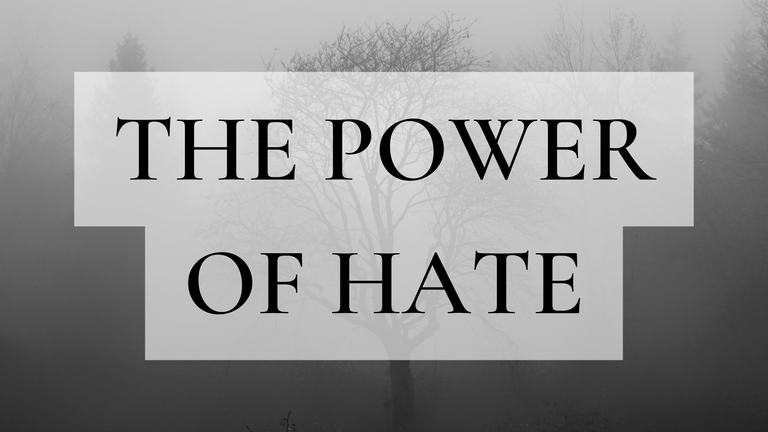It can be seen as absurdity to talk about hate in a world that often extols the virtues of love, compassion, and understanding. It may seem counterintuitive to explore the power its power or to talk about hate in a glorified way. However, It is essential to acknowledge and understand this power not to glorify it but to confront its destructive potential and seek avenues for healing and transformation.

Hate is a potent and complex force that permeates the human experience, leaving indelible marks on societies and individuals alike.
We all know that Emotion like hate can be very rewarding yet poisonous.
But if hatred can be so destructive, why does it exist in the human nature in the first place?
The Answer is simple; The history of humanity is marred by instances where hate has been weaponized, leading to conflicts, discrimination, and even genocide. The power of hate, in these instances, is not just in the emotion itself but in its ability to catalyze collective action, often with devastating consequences.
Hate is a visceral emotion that, when harnessed, can galvanize individuals and communities towards a shared cause. Its power lies in its ability to mobilize people, providing them with a sense of purpose and unity against a perceived adversary. This dark allure is particularly potent when fueled by fear, resentment, or a sense of injustice.
The Fuel of Division
Hate has an insidious quality—it thrives on division. Whether fueled by religious, racial, political, or ideological differences, hate often exploits existing fault lines within societies. It creates an "us versus them" narrative, fostering an environment where empathy wanes, and dehumanization flourishes.
In the age of social media and rapid information dissemination, hate can spread like wildfire, exacerbating existing tensions and sowing seeds of discord. The power of hate, in this context, lies in its ability to fragment societies, creating echo chambers of animosity and further polarizing communities.
The Personal Toll of Hate
On a personal level, hate often begets more hate. It perpetuates cycles of violence, revenge, and retribution, creating a self-perpetuating cycle that can be challenging to break. The power of hate, when internalized, becomes a corrosive force that not only damages relationships but also corrodes the very fabric of one's soul.
While hate can be a rallying force on a societal level, its impact on individuals is profound and deeply personal. The power of hate manifests in emotional turmoil, eroding mental well-being and fostering a cycle of negativity. Hatred can consume individuals, distorting their perceptions and driving them to destructive actions.
Confronting the Power of Hate
Understanding the power of hate is not an endorsement but a call to action. It prompts us to confront the roots of hatred, addressing the underlying fears, insecurities, and injustices that fuel its flames. Recognizing that hate often stems from a place of ignorance or pain allows for the possibility of empathy and education as antidotes.
To confront the power of hate, it is imperative to promote dialogue, foster understanding, and actively seek common ground. By dismantling the divisive narratives that feed hatred, societies can pave the way for reconciliation, healing, and the cultivation of a more inclusive and compassionate ethos.
Exploring the power of hate is a sobering endeavor that necessitates introspection and collective responsibility. It is not a force to be taken lightly, as its consequences can be dire. However, by acknowledging its existence, understanding its dynamics, and actively working to dismantle its foundations, we can aspire to build a world where love, understanding, and unity prevail over the destructive allure of hatred. In doing so, we contribute to the ongoing narrative of humanity—a narrative that transcends the divisive power of hate and embraces the enduring strength of compassion.
The Transformative Power of Love and Understanding
While hate possesses a formidable power, it is not insurmountable. The antidote to hate lies in the transformative power of love, empathy, and understanding. Individuals and communities that actively choose compassion over animosity can break the chains of hatred, fostering environments where differences are celebrated rather than weaponized.
Empathy, education, and open-mindedness serve as powerful tools in dismantling the foundations of hate. By actively working towards understanding those with differing perspectives, fostering conversations that bridge divides, and advocating for justice and equality, individuals can counteract the power of hate at both personal and societal levels.

